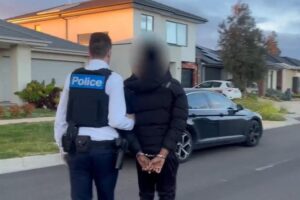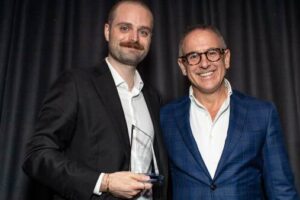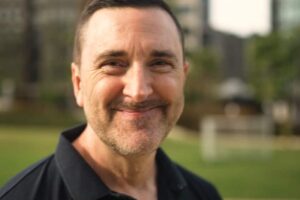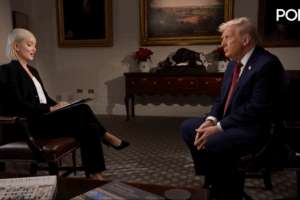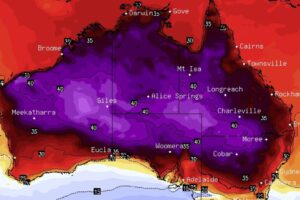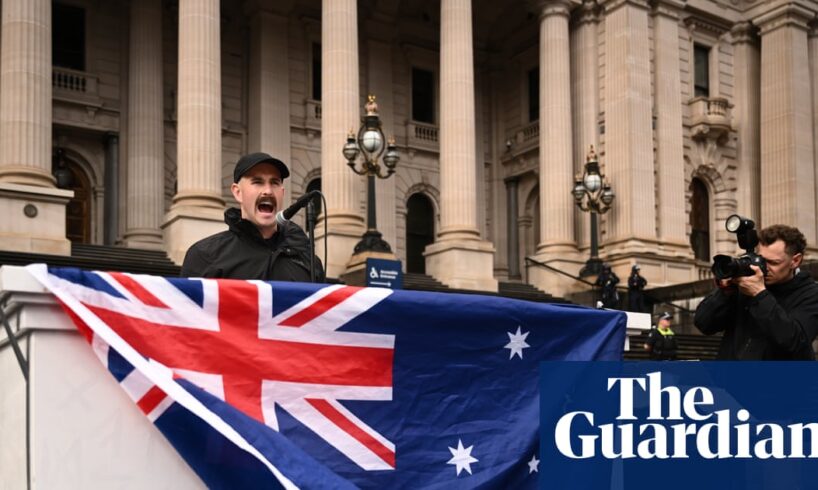
As neo-Nazis occupied the steps of Victoria’s parliament for the second time in as many years, many are asking the question: how has this happened again – and what can be done to prevent it?
On Sunday, neo-Nazi Thomas Sewell, the leader of the National Socialist Network (NSN), mounted the steps of the building, stood behind a podium draped with an Australian flag and delivered what can only be described as the keynote speech at the city’s March for Australia rally. Neo-Nazis were also involved in rallies in other states, although statements on the March for Australia Facebook page distanced the events from white supremacists.
Sign up: AU Breaking News email
It’s plausible some who attended Sunday’s rally may not have known Sewell, or his role in several other stunts committed by neo-Nazis in Victoria in recent years. In 2023, Sewell led a group that performed a Nazi salute on the parliament steps, prompting the Victorian government to ban the gesture.
But that likely changed by Tuesday, when footage of Sewell confronting the Victorian premier, Jacinta Allan, at a press conference in a West Melbourne park began circulating.
Publicity is exactly what groups such as Sewell’s crave and he unfortunately got plenty from the intervention. But it is difficult to ignore the ramifications or his baseless claim Allan was trying to “ban protest” in the state.
In reality, Allan and her government have long resisted the Coalition’s calls to introduce tougher “move-on” laws or to require permits for protests. The Victorian opposition leader, Brad Battin, renewed those calls after the weekend’s events.
“How come they continually get away with this here in our state?” Battin said on ABC Radio Melbourne on Wednesday.
“How can we continue to have a position where neo-Nazis turn up to events, to protests, and get their voice out there at every occasion? Why haven’t we acted on that in the past?”
Battin said in New South Wales permits had been required for more than 30 years and had been “very successful” in reducing violence and managing protest routes.
However, critics argue that permit systems hand too much power to police and courts.
Even Victoria’s new police chief, Mike Bush, has ruled out a permit system for protests in a series of interviews, saying they had not been effective in other states.
Permits don’t prevent unauthorised protests from occurring and it is worth noting neo-Nazis also appeared at Sydney’s March for Australia rally on Sunday, despite the system in place.
And, as one Labor MP quipped, “Do you seriously see Thomas Sewell applying for a permit?”
Calls for tougher “move-on” laws also overlook the fact that police already have considerable powers in Victoria. Officers can arrest or detain protesters if they reasonably believe a criminal offence is being committed.
On Sunday, those powers were used – six people were moved on and 12 were arrested. Still, some within Labor have privately questioned why those powers weren’t more forcefully applied.
Senator Lidia Thorpe has done so publicly, questioning why police did not follow the neo-Nazis to Camp Sovereignty.
“Why did police not use the powers that they already have and stopped them? It would have stopped the violence,” Thorpe said.
Allan has stressed the government’s anti-vilification laws, which come into effect on 20 September, will also tackle the escalating neo-Nazi activity. The laws create two new criminal offences for serious vilification, which carry up to five years’ imprisonment.
But in any event, the rise of neo-Nazis is not going to be solved by laws alone. The reality is that radicalisation happens over years, often long before any offence is committed.
Two inquiries, now gathering dust, provide the government with paths forward.
The first, a 2021 inquiry into anti-vilification, led to the state’s new laws but also included several broader recommendations, including expanding education programs aimed at strengthening “respect, diversity and cohesion” and community education campaigns on vilification and hate conduct.
A 2022 inquiry into far-right extremism recommended resourcing specialised youth and education programs to prevent radicalisation, more funding for education strategies to help build online literacy for young people to resist far-right propaganda and counter online recruitment.
What both inquiries emphasised is clear: long-term, resource-intensive work designed to stop people becoming radicalised in the first place.
It’s something Allan herself acknowledged, which may have gotten more attention were it not for Sewell’s interruption.
“This goes beyond just being a law and order issue,” she said on Tuesday. “There is something deeper going on here. People’s sense of economic security is being exploited by a small number of people, who are wanting to use cracks in our society and exploit them to drive division in our society.
“The pathway to social cohesion is in building a stronger society, a place where people have jobs, people have rights and are respected.”
This kind of work is slow. It requires commitment across multiple election cycles. But it’s the work that actually needs to be done.

